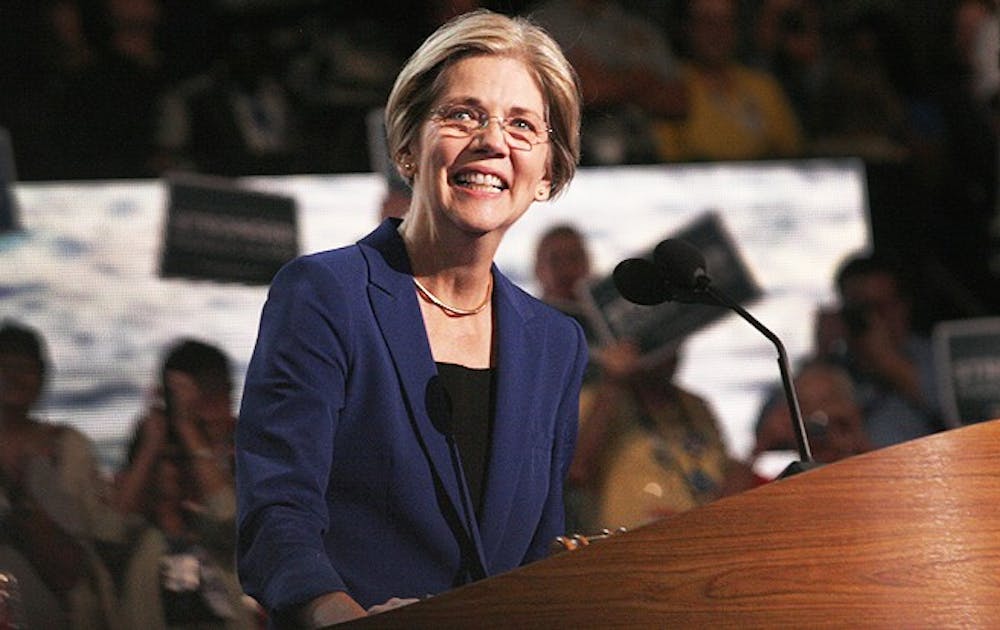CHARLOTTE — Wednesday night was ladies’ night at the Democratic National Convention.
Men delivered the majority of the 55 speeches on the schedule, but in an election season where questions regarding health care and equal pay play an important role in both campaigns, it is not a surprise that women’s issues were woven into nearly all of Wednesday evening’s remarks.
“The hard-won rights of women are on the ballot,” House Minority Leader Nancy Pelosi said in her speech. “Democrats trust the judgment of women…. When you go the polls, vote for women’s rights.”
Democrats used the Affordable Care Act of 2010 as the primary platform to display President Barack Obama’s support for women. Cecile Richards, president of Planned Parenthood Federation of America, spoke at length about what Obamacare will do for women and what is at stake if it is repealed under a Republican president.
“This year, women learned that if we aren’t at the table, we’re on the menu,” Richards said, referencing Republican-controlled House pushes to redefine rape and cut funding to Planned Parenthood. “It’s like we woke up in a bad episode of Mad Men.”
During her remarks, audience members waved hundreds of purple and pink signs reading “Our health care, our choice, our vote.” The initial “O” was replaced by the gender symbol for female. Volunteers distributed these signs to convention-goers throughout the night.
In an interview with The Chronicle, Richards detailed what Obamacare guarantees for women—such as coverage for birth control and preventive care—noting the particular relevance for young women.
“It is important for my daughter who is in college,” Richards said. “Birth control is a fundamental economic issue for her—that’s $50 to $60 back in her pocket a month.”
Richards also encouraged young women to educate themselves on both campaigns’ stances on women’s health care.
“I’ve learned that young women listen to each other,” she said in the interview. “Young women listen to young women, and they listen a lot more than they will to politics or television ads.”
Convention attendees also heard from Planned Parenthood patient Elizabeth Bruce, who credits the organization’s doctors with successfully diagnosing her with endometriosis—a leading cause of infertility.
“When Mitt Romney and Paul Ryan make threats about getting rid of Planned Parenthood funding, it’s clear that they haven’t given a thought to women like me,” Bruce said. “Women with limited resources who are sick and scared.”
The night’s female speakers comprised the top Democratic party leadership, including Pelosi, who took the podium for the second time this convention, and Sen. Patty Murray of Washington, the fourth highest ranking Democrat in the Senate. Up-and-comers U.S. Senate candidate Elizabeth Warren of Massachusetts and women’s rights activist Sandra Fluke asserted themselves as prominent voices within the party.
Fluke positioned the choice between Romney and Obama as one that she believes will result in two very different Americas for women.
“[Romney’s America will be] an America in which access to birth control is controlled by people who will never use it—in which politicians redefine rape so survivors are victimized all over again,” Fluke said. “In which someone decides which domestic violence victims deserve help and which don’t.”
Warren roused the crowd with emotional appeals, quoting a passage from the Bible—Matthew 25:40—and by making an incensed assault on the Wall Street executives who sparked the financial crisis.
Tuesday featured joint remarks from the women of the U.S. House of Representatives—a gesture repeated by the women of the U.S. Senate on the convention’s second day.
There were further, perhaps more subtle, nods to the female voter base. Illegal immigrant Benita Veliz, a 27-year-old woman who emigrated from Mexico as a child, was chosen as the speaker on the DREAM Act. Veliz introduced noted Hispanic talk show host Cristina Saralegui, who spoke further on the proposed legislation.
Women’s equality leader Lilly Ledbetter, who spoke at the convention Tuesday, traveled the arena floor sporting a canary yellow ensemble distinguishing her from the crowd. Ledbetter is the namesake of the Lilly Ledbetter Fair Pay Act of 2009, which streamlines the process for suing against discriminatory pay.
The effect of these speeches was quickly apparent in the media. At press time early Thursday morning, “Sandra Fluke” and “Elizabeth Warren” were trending topics on Twitter. So was “Hillary,” even though Secretary of State Hillary Clinton was not in attendance.
The pressure is on first lady Michelle Obama and Anne Romney as well. After strong speeches at their respective conventions, it remains to be seen how these women will proceed in the election season.
These speeches—and the reaction from the local and worldwide audience—fuel predictions about the importance of the female vote this November. GOP vice presidential candidate Paul Ryan has received criticism for his vote against the Fair Pay Act of 2012, and Obama is seeking to gain married woman voters—whom he lost to John McCain in 2008 by 47 to 53 percent.
Get The Chronicle straight to your inbox
Signup for our weekly newsletter. Cancel at any time.

